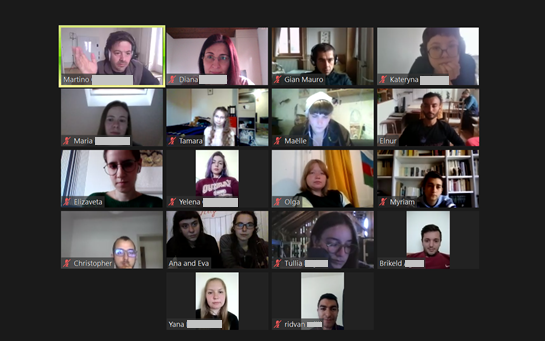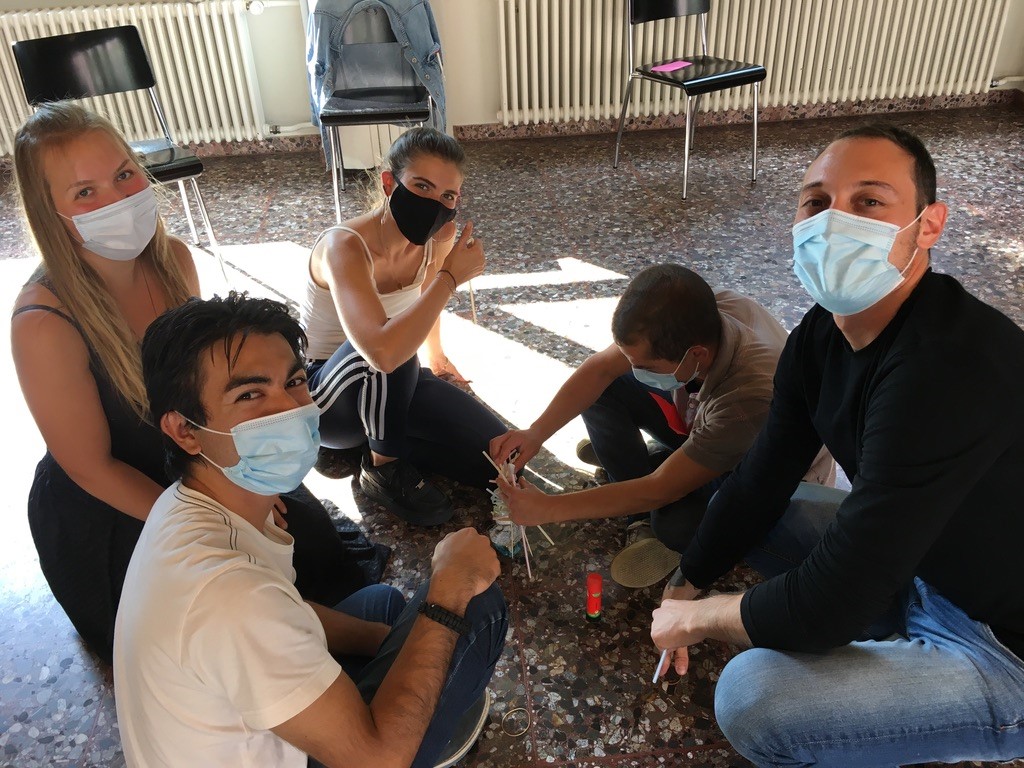The European Voluntary Service, a success despite the pandemic: testimonies
The European Voluntary Service (EVS) enables young people aged 17 to 30 to carry out volunteer work lasting between 2 and 12 months in Europe and its neighbouring countries. This programme provides them with an opportunity to develop new skills and enjoy a rewarding, intercultural experience while actively providing their host organisations with welcome assistance. The outbreak of the COVID-19 pandemic in Europe at the beginning of 2020 made it much more difficult to organise EVS mobilities due to the closure of borders, the confinement and quarantine measures taken by the different governments, etc. In light of this, certain mobilities had to be cancelled, shortened, postponed or placed on standby. Despite the pandemic, 13 young Swiss people nevertheless travelled to Europe while some 32 young foreigners arrived in Switzerland to carry out voluntary work*, a true success story under the current conditions. How was it made possible?
*Young people who carried out some or all of their voluntary service projects between January and November 2020.
Collaboration
With or without COVID, the collaboration of numerous stakeholders is a key point in the EVS programme: the coordinating organisation is responsible for submitting the funding request as well as managing the budget and coordination while the hosting organisation prepares to host the volunteer and the sending organisation prepares the volunteers before their departure. The volunteers actively participate in organising their volunteer project with the assistance of these organisations. The outbreak of the pandemic pushed these different stakeholders to strengthen their collaboration even further. As each country implemented different measures to combat the spread of the virus, information had to move quickly between the organisations from the country of departure and those in the host country in order to organise the mobilities.
Flexibility/adaptation
Even during a voluntary service organised in a normal situation, both the volunteers and the organisations involved need to display flexibility and adaptability to a new environment, a new culture, a new person, last-minute unforeseen events, etc. The arrival of COVID nevertheless forced everyone to adapt to an even more complicated and constantly changing context.
Some host organisations were more severely affected by the pandemic than others and were forced to alter some of their activities: the Ton sur Ton Foundation, a regional competence centre in artistic training, for example, was forced to cancel its on-site courses for several weeks, replacing them with an online programme. As for the Soup Kitchen in Lausanne, it must now serve meals outside.
Naturally, these changes also altered the timetables and tasks performed by the volunteers in these organisations. Christophe Studer, Director of Ton sur Ton, explains that “no longer welcoming our European volunteers during the COVID pandemic would have been something of a failure, a match forfeited, an easy option.” As much the coordinating, sending and hosting organisations as the volunteers therefore had to demonstrate even more flexibility, resourcefulness and adaptation than usual to ensure that these international exchanges could take place. It was a challenge that most of them successfully overcame.
Maria, a Russian volunteer
An EVS project is in itself already a unique experience – the pandemic has simply made it even more unique.

Support and Accompany
One of the cornerstones of the EVS programme is the follow-up of the young participants both before and during their voluntary service. They initially participate in a “pre-departure training” in their home country designed to provide them with the best possible preparation for their exchange. Naturally, the issue of COVID and its impact is now also discussed during this training. Once in the host country, the young people involved are monitored and supported by several people: a tutor within the host organisation as well as an external mentor. These people help accompany the volunteer’s learning and his/her integration in his/her new working and living environment.
The volunteers also participate in one or two trainings organised by the national agencies in the host country (for example Movetia in Switzerland). This year, some of these training courses had to be held online due to the pandemic, presenting both the organisers and the participants with a considerable challenge. Despite the existence of a well-developed support system before the COVID outbreak, the health crisis pushed the different stakeholders to introduce additional support measures for the young volunteers. In addition to the usual difficulties linked to an intercultural exchange, the participants had to deal with other complications.
Myriam, from Italy
In this situation, it proved very difficult to meet new people and make friends. Another aspect which made this period challenging was the closure of the museums, theatres, cinemas, etc.
The Swiss coordinating organisations, SCI and ICYE, had to rethink the way in which they accompany their volunteers. According to Sara Moreno, Program manager EVS at SCI, “We switched all our contacts with the volunteers and partners to an online format in order to avoid physical meetings, while nevertheless continuing to provide them with the necessary support so that they felt they are in a safe […] environment.” A similar approach was adopted by ICYE, as their EVS manager, Adélie Clément, explains: “We organised meetings via video-conference sites, used online tools such as Miro to facilitate interactive discussions with the volunteers about their experiences and implemented sharing platforms (for example Padlet) via which the volunteers can be in contact with one another.”
These intensified support measures seem to have been successful, as most volunteers who were already on site at the outbreak of the pandemic decided to stay and pursue their experience. While many of them regret that they were unable to enjoy the same freedom as during an EVS without COVID-19, they nevertheless all reflect on a highly rewarding experience.

Motivation and pulling together
Participating in an EVS always means having the necessary motivation to help an organisation, develop new competences and enjoy an intercultural experience. To participate in an EVS during a pandemic, that motivation needs to be increased ten-fold. Due to COVID-19, numerous new obstacles were thrown up. This did not seem to discourage either the young participants or the organisations. Christophe Studer, of Ton sur Ton which welcomed two volunteers this year, shares his experience: “What is so precious about the EVS programme is the chance to work side-by-side with a volunteer for several months, accompanying one another through the good times and the more difficult periods, living each voluntary service project to the fullest while providing support and taking responsibility for one another. Overcoming this global crisis together is also an integral part of the experience – it’s part and parcel of real life.”
Christophe Studer, of Ton sur Ton
What is so precious about the EVS programme is the chance to work side-by-side with a volunteer for several months, accompanying one another through the good times and the more difficult periods, living each voluntary service project to the fullest while providing support and taking responsibility for one another. Overcoming this global crisis together is also an integral part of the experience – it’s part and parcel of real life.
Several volunteers talk about their desire to help their host organisation through these difficult times while learning a great deal from the situation:
- Maëlle, a volunteer from France: “It was my duty to help them during this difficult period and to offer them my skills. Despite the cancellations and the numerous problems that arose, my EVS ran very smoothly and I was able to take full advantage of all my experiences.”
- “I thought that it would be a good way to be useful and to contribute something. And I continue to believe that it is better than sitting at home doing nothing; at least here, I’m learning a new language and enjoying new experiences,” says Mariam, a Swiss volunteer in Liechtenstein.
- As for Lise, a Swiss volunteer in France, she says that thanks to COVID, she has learned “how other countries, other cultures live […] when faced with this exceptional situation.”
As these testimonies show, the volunteers who decided to continue their voluntary service or start it despite the pandemic together with their host organisations all acknowledge that they have taken many positives from the experience.
Perhaps the secret behind the organisation of the EVS programme during a global pandemic lies in a programme that already had a solid structure before the crisis and could count on the outstanding commitment of the different organisations and volunteers in order to continue functioning. Naturally, everyone hopes that the pandemic will soon be nothing more than an unpleasant memory, but until then, those involved have made the very best of a bad situation.